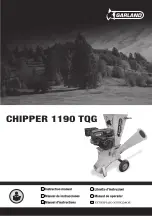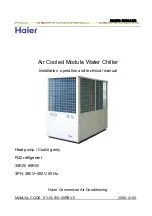
14
ARTC-SVX001B-EN
Trane will document and photograph the status of the
unit prior to shipment and carry out the instructions
detailed in the factory order regarding in-shop
preparation of units for long-term storage.
Customer Responsibilities
Upon receipt of a chiller system, the customer must
conduct thorough internal and external inspections,
removing packaging material as needed for access to
all components.
Visible damage must be noted on the signed and dated
bill of lading. The customer may request a carrier
inspection by telephone or in person, but any such
request should be confirmed in writing. It is
recommended that the customer request that the
carrier inspect the damage within 72 hours of
notification.
The customer must store the chiller system in a dry,
non-corrosive, dust- and vibration-free environment
due to the exposure sensitivities of the microprocessor
controllers and to prevent electrical terminations from
deteriorating from non-use. Conditions in storage
locations should not fall below -20 °F (-29 °C) or exceed
150 °F (66 °C).
Components sealed in plastic shrink-wrap are not
exempt from these storage requirement. Moisture can
potentially collect inside the plastic film, resulting in
corrosion of the cabinet and electronic components.
Any chiller system packaging that is removed must be
replaced with similar protective covering as soon as
possible.
Failure to adhere to these long-term storage
requirements may void the Trane warranty. Any
component that is damaged or inoperable due to
improper storage may have its warranty voided.
Handling of the Modules
The packaging from the factory permits lifting with a
suitable crane. Ensure straps are in good working
condition and that they are rated for the weight of the
machines. Spreader bars may be required for effective
rigging and to avoid damage to the chiller modules.
The chiller modules arrive fully charged with
refrigerant. As required under Federal regulations,
installation, start-up and service should be performed
by fully-qualified, factory-certified, personnel.
W
WA
AR
RN
NIIN
NG
G
P
Prro
op
pe
err F
Fiie
elld
d W
Wiirriin
ng
g a
an
nd
d G
Grro
ou
un
nd
diin
ng
g
R
Re
eq
qu
uiirre
ed
d!!
F
Fa
aiillu
urre
e tto
o ffo
ollllo
ow
w cco
od
de
e cco
ou
ulld
d rre
essu
ulltt iin
n d
de
ea
atth
h o
orr
sse
erriio
ou
uss iin
njju
urry
y..
A
Allll ffiie
elld
d w
wiirriin
ng
g M
MU
US
ST
T b
be
e p
pe
errffo
orrm
me
ed
d b
by
y q
qu
ua
alliiffiie
ed
d
p
pe
errsso
on
nn
ne
ell.. IIm
mp
prro
op
pe
errlly
y iin
nsstta
alllle
ed
d a
an
nd
d g
grro
ou
un
nd
de
ed
d
ffiie
elld
d w
wiirriin
ng
g p
po
osse
ess F
FIIR
RE
E a
an
nd
d E
EL
LE
EC
CT
TR
RO
OC
CU
UT
TIIO
ON
N
h
ha
azza
arrd
dss.. T
To
o a
av
vo
oiid
d tth
he
esse
e h
ha
azza
arrd
dss,, y
yo
ou
u M
MU
US
ST
T ffo
ollllo
ow
w
rre
eq
qu
uiirre
em
me
en
nttss ffo
orr ffiie
elld
d w
wiirriin
ng
g iin
nsstta
alllla
attiio
on
n a
an
nd
d
g
grro
ou
un
nd
diin
ng
g a
ass d
de
essccrriib
be
ed
d iin
n N
NE
EC
C a
an
nd
d y
yo
ou
urr llo
occa
all//
sstta
atte
e//n
na
attiio
on
na
all e
elle
eccttrriicca
all cco
od
de
ess..
W
WA
AR
RN
NIIN
NG
G
E
Elle
eccttrriicca
all S
Sh
ho
occkk,, E
Ex
xp
pllo
ossiio
on
n,, o
orr A
Arrcc
F
Flla
assh
h H
Ha
azza
arrd
d!!
F
Fa
aiillu
urre
e tto
o ffo
ollllo
ow
w tth
he
esse
e iin
nssttrru
uccttiio
on
nss cco
ou
ulld
d rre
essu
ulltt iin
n
d
de
ea
atth
h o
orr sse
erriio
ou
uss iin
njju
urry
y..
••
IIn
nsstta
allll tth
he
e p
prro
od
du
ucctt iin
n a
an
n a
ap
pp
prro
op
prriia
atte
e
e
elle
eccttrriicca
all//ffiirre
e e
en
nccllo
ossu
urre
e p
pe
err llo
occa
all
rre
eg
gu
ulla
attiio
on
nss.. D
Do
o n
no
ott iin
nsstta
allll tth
he
e p
prro
od
du
ucctt iin
n
h
ha
azza
arrd
do
ou
uss o
orr cclla
assssiiffiie
ed
d llo
occa
attiio
on
nss..
••
D
Do
o n
no
ott u
usse
e tth
he
e p
prro
od
du
ucctt ffo
orr lliiffe
e o
orr ssa
affe
etty
y
a
ap
pp
plliicca
attiio
on
nss..
••
D
Do
o n
no
ott e
ex
xcce
ee
ed
d tth
he
e p
prro
od
du
ucctt rra
attiin
ng
gss o
orr
m
ma
ax
xiim
mu
um
m lliim
miittss.. P
Prro
od
du
uccttss rra
atte
ed
d o
on
nlly
y ffo
orr
b
ba
assiicc iin
nssu
ulla
attiio
on
n m
mu
usstt b
be
e iin
nsstta
alllle
ed
d o
on
n
iin
nssu
ulla
atte
ed
d cco
on
nd
du
ucctto
orrss..
••
C
Cu
urrrre
en
ntt ttrra
an
nssffo
orrm
me
err sse
ecco
on
nd
da
arriie
ess ((ccu
urrrre
en
ntt
m
mo
od
de
e)) m
mu
usstt b
be
e ssh
ho
orrtte
ed
d o
orr cco
on
nn
ne
ecctte
ed
d tto
o a
a
b
bu
urrd
de
en
n a
att a
allll ttiim
me
ess..
••
R
Re
em
mo
ov
ve
e a
allll w
wiirre
e ssccrra
ap
pss,, tto
oo
ollss,, rre
ep
plla
acce
e a
allll
d
do
oo
orrss,, cco
ov
ve
errss a
an
nd
d p
prro
otte
eccttiiv
ve
e d
de
ev
viicce
ess b
be
effo
orre
e
p
po
ow
we
erriin
ng
g tth
he
e e
eq
qu
uiip
pm
me
en
ntt..
Site Preparation and Clearances
Chiller modules must be installed on a level surface
that has been checked by a qualified structural
engineer to support the weight of the fluid-filled
modules and the connective piping to and from the
chiller. Installations must account for minimum service
access clearances as may be practical or required by
local building codes.
Chiller Clearances
One of the most critical factors affecting the
performance of air-cooled chillers is air flow above and
around the chiller modules. Walls, roofs, overhangs,
and nearby mechanical heat sources can all degrade
chiller performance. The further an air-cooled chiller is
from such obstacles, the more efficiently it will operate.















































